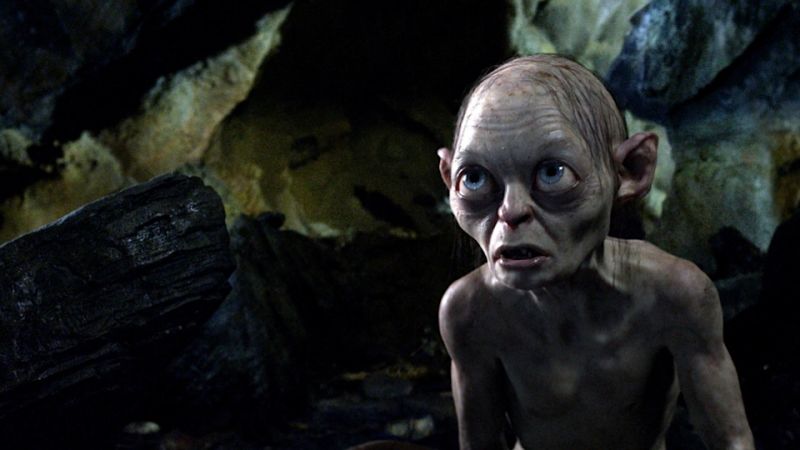
hobbit [hob-it] ExamplesWord Origin noun
- a member of a race of imaginary creatures related to and resembling humans, living in underground holes and characterized by their good nature, diminutive size, and hairy feet.
- a nickname for Homo floresiensis.
Origin of hobbit 1937; coined by J. R. R. Tolkien in his fantasy novel “The Hobbit” Examples from the Web for hobbit Contemporary Examples of hobbit
I came away from the end of The Hobbit more excited about making movies than I ever had.
‘No Regrets’: Peter Jackson Says Goodbye to Middle-Earth
Alex Suskind
December 4, 2014
But the thing with The Hobbit I will tell you… I went into it very unprepared.
‘No Regrets’: Peter Jackson Says Goodbye to Middle-Earth
Alex Suskind
December 4, 2014
The other was called “Legolas From The Hobbit Tries to Order at Taco Bell.”
Andy Samberg’s ‘SNL’ Finale Was Wonderfully Weird
Kevin Fallon
May 18, 2014
Much of its growth has been driven by two film franchises, the James Bond movies and “The Hobbit” trilogy.
Inside MGM’s Surprising Turnaround: ‘Robocop,’ ‘Bond,’ and ‘The Hobbit’
The Wrap
February 16, 2014
Others boast colorful tiles, captain windows to take in the vista, and fitted doors that give the appearance of a hobbit dwelling.
New Mexico’s Amazing Man-Made Caves
Nina Strochlic
December 12, 2013
British Dictionary definitions for hobbit hobbit noun
- one of an imaginary race of half-size people living in holes
- a nickname used for a very small type of primitive human, Homo floresiensis, following the discovery of remains of eight such people on the Island of Flores, Indonesia, in 2004
Derived Formshobbitry, nounWord Origin for hobbit C20: coined by J. R. R. Tolkien, with the meaning “hole-builder” Word Origin and History for hobbit Hobbit n.
1937, coined in the fantasy tales of J.R.R. Tolkien (1892-1973).
On a blank leaf I scrawled: ‘In a hole in the ground there lived a hobbit.’ I did not and do not know why. [Tolkien, letter to W.H. Auden, dated 1955]
The word also turns up in a very long list of folkloric supernatural creatures in the writings of Michael Aislabie Denham (d.1859), printed in volume 2 of “The Denham Tracts” [ed. James Hardy, London: Folklore Society, 1895], a compilation of Denham’s scattered publications. Denham was an early folklorist who concentrated on Northumberland, Durham, Westmoreland, Cumberland, the Isle of Man, and Scotland.
What a happiness this must have been seventy or eighty years ago and upwards, to those chosen few who had the good luck to be born on the eve of this festival of all festivals; when the whole earth was so overrun with ghosts, boggles, bloody-bones, spirits, demons, ignis fatui, brownies, bugbears, black dogs, specters, shellycoats, scarecrows, witches, wizards, barguests, Robin-Goodfellows, hags, night-bats, scrags, breaknecks, fantasms, hobgoblins, hobhoulards, boggy-boes, dobbies, hob-thrusts, fetches, kelpies, warlocks, mock-beggars, mum-pokers, Jemmy-burties, urchins, satyrs, pans, fauns, sirens, tritons, centaurs, calcars, nymphs, imps, incubuses, spoorns, men-in-the-oak, hell-wains, fire-drakes, kit-a-can-sticks, Tom-tumblers, melch-dicks, larrs, kitty-witches, hobby-lanthorns, Dick-a-Tuesdays, Elf-fires, Gyl-burnt-tales, knockers, elves, rawheads, Meg-with-the-wads, old-shocks, ouphs, pad-foots, pixies, pictrees, giants, dwarfs, Tom-pokers, tutgots, snapdragons, sprets, spunks, conjurers, thurses, spurns, tantarrabobs, swaithes, tints, tod-lowries, Jack-in-the-Wads, mormos, changelings, redcaps, yeth-hounds, colt-pixies, Tom-thumbs, black-bugs, boggarts, scar-bugs, shag-foals, hodge-pochers, hob-thrushes, bugs, bull-beggars, bygorns, bolls, caddies, bomen, brags, wraiths, waffs, flay-boggarts, fiends, gallytrots, imps, gytrashes, patches, hob-and-lanthorns, gringes, boguests, bonelesses, Peg-powlers, pucks, fays, kidnappers, gallybeggars, hudskins, nickers, madcaps, trolls, robinets, friars’ lanthorns, silkies, cauld-lads, death-hearses, goblins, hob-headlesses, bugaboos, kows, or cowes, nickies, nacks necks, waiths, miffies, buckies, ghouls, sylphs, guests, swarths, freiths, freits, gy-carlins Gyre-carling, pigmies, chittifaces, nixies, Jinny-burnt-tails, dudmen, hell-hounds, dopple-gangers, boggleboes, bogies, redmen, portunes, grants, hobbits, hobgoblins, brown-men, cowies, dunnies, wirrikows, alholdes, mannikins, follets, korreds, lubberkins, cluricauns, kobolds, leprechauns, kors, mares, korreds, puckles korigans, sylvans, succubuses, blackmen, shadows, banshees, lian-hanshees, clabbernappers, Gabriel-hounds, mawkins, doubles, corpse lights or candles, scrats, mahounds, trows, gnomes, sprites, fates, fiends, sibyls, nicknevins, whitewomen, fairies, thrummy-caps, cutties, and nisses, and apparitions of every shape, make, form, fashion, kind and description, that there was not a village in England that had not its own peculiar ghost. Nay, every lone tenement, castle, or mansion-house, which could boast of any antiquity had its bogle, its specter, or its knocker. The churches, churchyards, and crossroads were all haunted. Every green lane had its boulder-stone on which an apparition kept watch at night. Every common had its circle of fairies belonging to it. And there was scarcely a shepherd to be met with who had not seen a spirit!
[Emphasis added] It is curious that the name occurs nowhere else in folklore, and there is no evidence that Tolkien ever saw this. The word also was recorded from 1835 as “a term generally used in Wales to express a quantity made up of four Welsh pecks.” Hobbitry attested from 1947.
 Liberal Dictionary English Dictionary
Liberal Dictionary English Dictionary